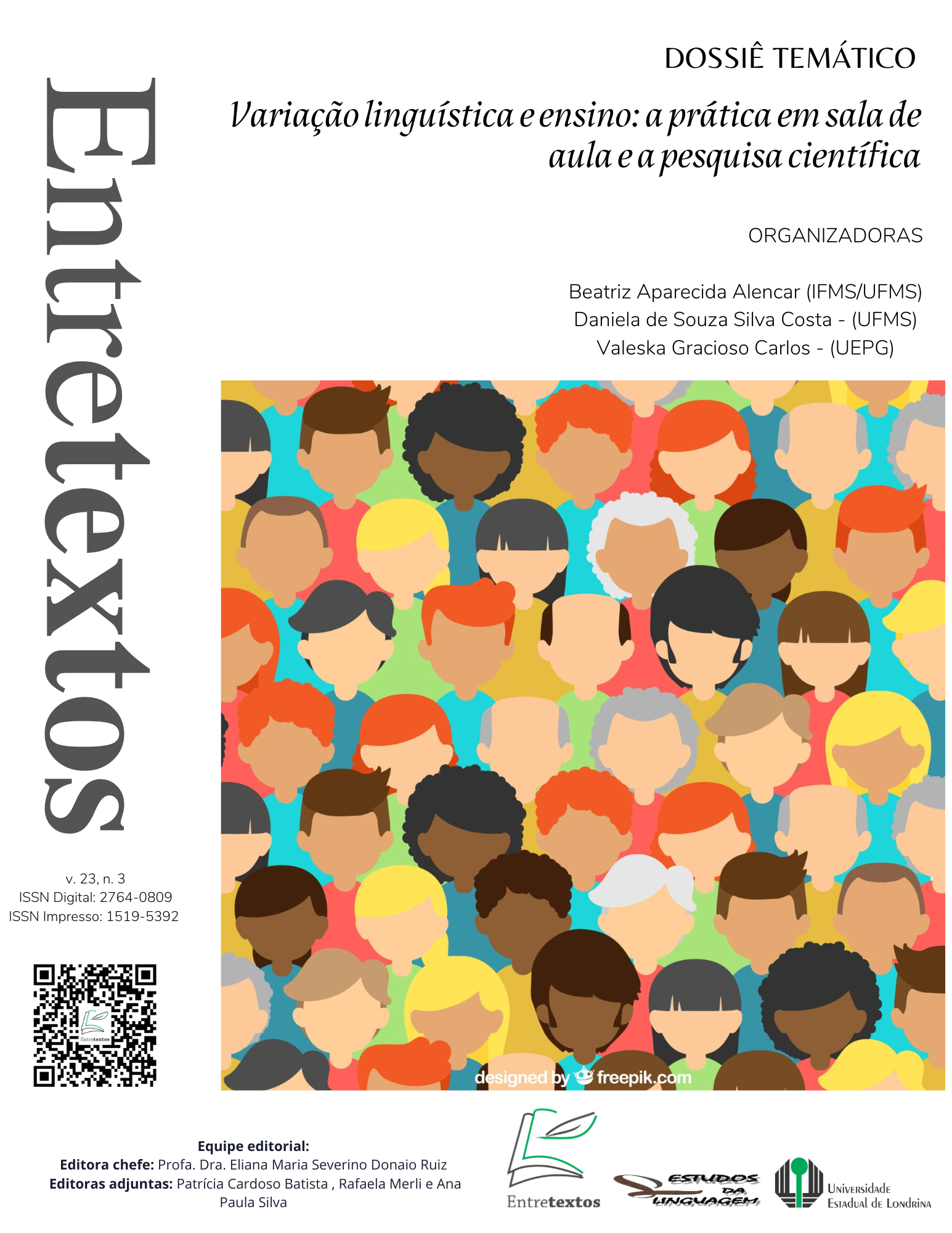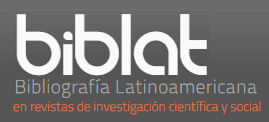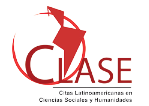Oportunidades perdidas: uma análise da variação linguística em livros didáticos
DOI:
https://doi.org/10.5433/1519-5392.2023v23n3p06-27Keywords:
Linguistic variation, Textbooks, PortugueseAbstract
Based on Educational Sociolinguistics (BORTONI-RICARDO, 2004; BAGNO, 2007), the aim of this study is to verify how linguistic variation is approached in three textbook collections directed at the final grades of elementary school. The presence of keywords “linguistic variation(s)”, “linguistic variety(ies)” and “linguistic prejudice” was analysed, considering who they were directed to and to which linguistic subjects they were related. Results show that the approach to linguistic variation is concentrated in a specific grade, depending on the collection; the keywords show up more in fragments directed at the teacher; there is more emphasis on register and lexical variation. Moreover, we have selected three subjects that could favor an approach on linguistic variation: orality, agreement and pronominal placement. We observed how these subjects were presented and the proposed activities. We could see that the overall approach tends to be traditional, with variation facts being mainly sidelined and their treatment being heavily dependent on the teacher’s knowledge on the matter. The collections are incipient, since linguistic variation is, most of the times, disconnected from activities that would allow for the creation of hypotheses about the variable rules. There are glimpses of what could be a successful approach to linguistic variation, but lost opportunities are still the norm.
Downloads
References
ANTUNES, I. Língua, Texto e Ensino: outra escola possível. São Paulo: Parábola Editorial, 2009.
BAGNO, M. Português ou Brasileiro? Um convite à pesquisa. São Paulo: Parábola Editorial, 2001.
BAGNO, M. Nada na língua é por acaso: por uma pedagogia da variação linguística. São Paulo: Parábola Editorial, 2007.
BAGNO, M. Preconceito linguístico: o que é, como se faz. 54. ed. São Paulo: Edições Loyola, 2011.
BORTONI-RICARDO, S. M. Educação em língua materna: a sociolingüística na sala de aula. São Paulo: Parábola Editorial, 2004 (Col. Linguagem, nº. 4).
BRASIL. Ministério da Educação. Base Nacional Comum Curricular. Brasília, DF: MEC, 2018.
BORGATTO, A. M. T.; BERTIN, T. C. H.; MARCHEZI, V. L. de C.. Português - [6, 7º, 8º e 9º ano]. Projeto Teláris. Manual do Professor - São Paulo: Ática, 2022.
DELMANTO, D.; CARVALHO, L. B. Português: conexão e uso [6º, 7º, 8º e 9º ano]. 1º edição. São Paulo: Editora Saraiva, 2018.
FRANCHI, C. Mas o que é mesmo “Gramática”?. São Paulo: Parábola, 2006.
GUY, G. R. Variation in the group and the individual: the case of final stop deletion. In LABOV, W. (ed.), Locating language in time and space. New York: Academic Press. 1–36, 1980.
LABOV, W. Padrões sociolingüísticos. Trad. de M. Bagno; M. M. P. Scherre; C. R. Cardoso. São Paulo: Parábola Editorial, 2008 [1972].
LOBO, T. A colocação dos clíticos em Português: duas sincronias em confronto. Dissertação de Mestrado. Lisboa: Universidade de Lisboa, 1992.
MODERNA, Editora. Araribá Conecta – Português [6, 7º, 8º e 9º ano]. 1. ed. São Paulo: Moderna, 2022.
POSSENTI, S. Por que (não) ensinar gramática na escola. Campinas: Mercado de Letras, 1995.
SCHERRE, M. M. P. Reanálise da concordância nominal em português. Tese de Doutorado. Rio de Janeiro: UFRJ, 1988.
SERRA, C; CALLOU, D. A interrelação de fenômenos segmentais e prosódicos: confrontando três comunidades. Textos Selecionados do XXVIII Encontro Nacional da APL – Universidade do Faro (Algarve-Portugal), 2013.
SOARES, M Linguagem e escola: uma perspectiva social. 8. ed. São Paulo: Ática, 1994.
TARALLO, F. A pesquisa sociolinguística. São Paulo: Ática, 2000.
VIEIRA, S. R. Três eixos para o ensino de gramática. In: VIEIRA, Silvia Rodrigues. Gramática, variação e ensino: diagnose e propostas pedagógicas. São Paulo: Blucher, 2018. 180 p.
WEINREICH, U.; LABOV, W.; HERZOG, M. Fundamentos empíricos para uma teoria da mudança lingüística. Trad. de M. Bagno. São Paulo: Parábola, 2006 [1968].
Downloads
Published
How to Cite
Issue
Section
License
Copyright (c) 2024 Camila Witt Ulrich, Gabriela Tornquist Mazzaferro, Leonor Simioni

This work is licensed under a Creative Commons Attribution 4.0 International License.
Entretextos adota a Licença Creative Commons Attribution 4.0 International, portanto, os direitos autorais relativos aos artigos publicados são do(s) autor (es).
Sob essa licença é possível: Compartilhar - copiar e redistribuir o material em qualquer suporte ou formato. Adaptar - remixar, transformar, e criar a partir do material, atribuindo o devido crédito e prover um link para a licença e indicar se mudanças foram feitas.




















